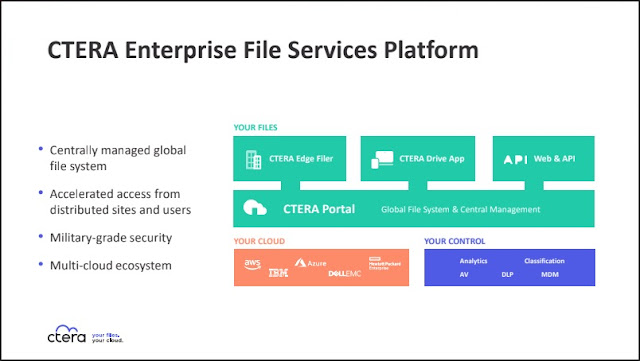This report was published for the 1st time on StorageNewsletter April 23rd.
The recent 34th edition should have been the 3rd visit in Israel to meet innovators and disruptors in several domains like data and storage management, cyber security and IT infrastructure. Under these exceptional circumstances, these face-to-face meetings were transformed into online sessions with seven companies: CTera Networks, Deep Instinct, Infinidat, Kaminario, Lightbits Labs, OwnBackup and Weebit Nano.
We had the opportunity to get some product announcements, of course company and products refresh, as well as some new strategic directions for them.
CTera Networks
It refreshed the team with its edge strategy illustrating the market penetration of its recent Edge Media Edition and X Series as a ROBO HCI server built with HPE. Nutanix could be the next platform of choice for the X Series. The Edge Media Edition is a high performance edge server dedicated to media production for distributed enterprises.
These two products of course leverage CTera Global File System and create a horizontal and ubiquitous file sharing layer regardless of the distance between systems. The team has also developed a NAS migration tool, delivered with CTera filers, to ease deployments. A new global console CTera Insight acts as the central point of management for the entire environment. And finally, the firm expands its presence and integration capabilities in DevOps world with a SDK and Ansible module.
Deep Instinct
It is a recent player, founded in 2015 with investors such as Samsung, HP and Nvidia, focused on cyber security leveraging deep learning to prevent threats in real time. It capitalizes on years of data, experience and algorithms coupled with AI to anticipate threats before they occur and finally avoid any reaction like several traditional approach do.
Via one single platform, Deep Instinct covers any environment and any OS. Today’s number of devices, connected population and online business create huge exposure leveraged by cyber attackers with 350,000 new malicious programs every day. A big breach costs between $40 million to $350 million for enterprises and it represents 3.5 million new jobs in cybersecurity by 2021. But as things go complex, AI seems to be the right path to control, reduce and prevent attacks and potential associated damages. The company operates in 3 main steps with 20ms spent to detect a potential anomaly, then 50ms to analyze and classify, and then less than 1mn to remediate and contain the threat. Globally, the solution provides less than 0.0001% of false positives.
Infinidat
It did product update. CEO Moshe Yanai confirmed its growing footprint illustrated by 6EB deployed, representing 3.7EB in Americas, 1.9EB in EMEA and 388PB in APJ. This amount validates its approach and value for enterprise around low TCO and performance. A new business model, named FLEX, which aligns public cloud subscription with on-premises purchase completing the classic CapEx, Capacity-on-Demand and Neutrix Cloud. Consolidation is still a real criteria for Infinidat customers. Recently one swapped 18 storage arrays by one InfiniBox and Zerto replaced 12 arrays by also one.
NVMe-oF is in beta at a few customers sites with RoCE and soon FC for internal array needs replacing SAS flash connectivity.
Kaminario
It made a new iteration towards the cloud with its Cloud Data Platform able to run on private cloud and AWS, GCP and Azure. To constitute this cloud-aware storage with mobility capabilities, Kaminario VisionOS, Flex and Clarity are coupled with NVMe-oF, container and Kubernetes.
It turns out that this approach reduces costs by 30% where the TCO is compared with AWS. It is the result of the right provisioning, data reduction and RAID.
Lightbits Labs
It has introduced NVMe/TCP covering its disaggregated model, decoupling compute to storage entities.
The implementation leverages the default Linux NVMe driver being independent on the host side and not intrusive at all in contrary of some other vendors in that category who require a dedicated specific block driver. LightOS is deployed on the storage server transforming it to a NVMe storage array. Version 2.0 of the Global FTL (Flash Translation Layer) introduced a cluster mode with multi-pathing and replication with a N+1 data protection method extended to N+2 planed for the 3.0 release scheduled for the end of the year. To summarize, firm’s differentiators are: 1/ SDS, 2/ Global FTL and 3/ NVMe/TCP driving commodities push.
The company signed a reseller agreement with Dell and Inspur.
OwnBackup
It confirms its position in Salesforce backup with the largest market footprint. It has developed the preferred Salesforce data protection solution addressing a famous Salesforce drawback, its inability to protect data. We can understand this for an IaaS vendor but for a SaaS provider this is incredible. And the other surprise is that 88% of Salesforce users don’t backup data at all taking risks and exposing their enterprise to a serious business impact. OwnBackup is recognized as one of the most advanced Salesforce data protection with flexible RPO and RTO. It works one a real CDP mode with a time interval of 2s.
Weebit Nano
Founded in 2014 and traded on the Australian market, it designs and develops ReRAM – Resistive RAM – based on SiOx (Silicon Oxide). ReRAM is promising claiming to be 1,000x faster, 1,000x more energy efficient with 100x high endurance than flash. The team targets to replace flash and provides a cost efficient persistent memory. The market is huge according to Weebit CEO Coby Hanoch and opportunities should come from China thanks to early deals with XTX Technolgoy and SiEn. Production should start at the end of 2020.

- 23rd IT Press Tour will rock again...
- Clumio, the new adventure for Poojan Kumar
- NetApp accentue son avance
- SimplyBlock to shake the SDS landscape
- Cloudian is the real S3 leader
- Silently, Minio eats the object storage world
- Excelero will take off very soon
- Weka.IO, the new High Performance File Storage
- Exten Technologies out of stealth
- Les Vainqueurs 2011



























0 commentaires:
Post a Comment